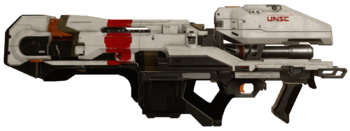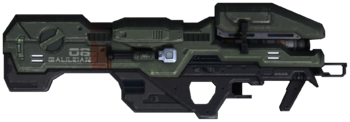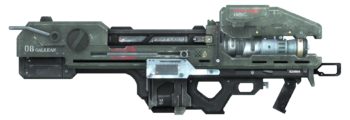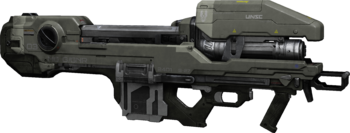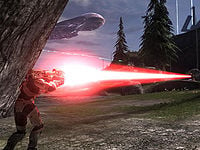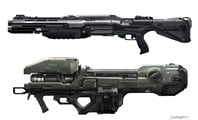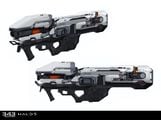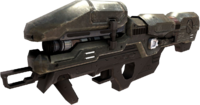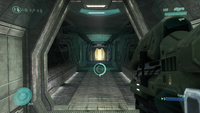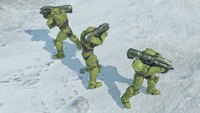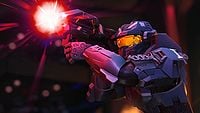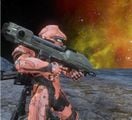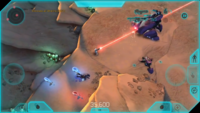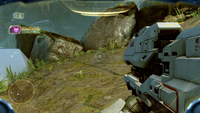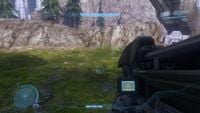M6 Spartan Laser: Difference between revisions
From Halopedia, the Halo wiki
(→List of appearances: Added Halo Wars 2) |
Spartan Matt (talk | contribs) No edit summary |
||
| Line 34: | Line 34: | ||
|range = Long{{Ref/Reuse|enc22}} | |range = Long{{Ref/Reuse|enc22}} | ||
}} | }} | ||
The '''Weapon/Anti-Vehicle Model 6 Grindell/Galilean Nonlinear Rifle''' ('''W/AV M6 G/GNR'''), colloquially known as the '''Spartan Laser''', is a man-portable and vehicle-mounted solid-state [[directed-energy weapon|directed-energy]] anti-vehicle weapon used by the [[United Nations Space Command]].{{Ref/Reuse|enc22}}{{Ref/Book|Id=enc09|Enc09|Page=315}} It is the only known directed-energy weapon manufactured by [[human]]s, aside from the [[Plasma rifle (Chalybs)|plasma rifle protoype]] created by [[Chalybs Defense Solutions]]. | The '''Weapon/Anti-Vehicle Model 6 Grindell/Galilean Nonlinear Rifle''' ('''W/AV M6 G/GNR'''), colloquially known as the '''Spartan Laser''', is a man-portable and vehicle-mounted solid-state [[directed-energy weapon|directed-energy]] anti-vehicle weapon used by the [[United Nations Space Command]].{{Ref/Reuse|enc22}}{{Ref/Book|Id=enc09|Enc09|Page=315}} It is the only known infantry directed-energy weapon manufactured by [[human]]s, aside from the [[Plasma rifle (Chalybs)|plasma rifle protoype]] created by [[Chalybs Defense Solutions]]. | ||
==Overview== | ==Overview== | ||
Revision as of 09:25, July 1, 2023
| W/AV M6 G/GNR "Spartan Laser" | |
|---|---|
| Production overview | |
|
Manufacturer: |
|
|
Model series: |
M6 |
|
Type: |
|
|
Cost: |
|
|
Variants: |
|
| Specifications | |
|
Length: |
98.8 centimetres (38.9 in)[3] - 121.1 centimetres (47.7 in)[4] |
|
Width: |
7.7 inches (20 cm) (M6/X)[5] |
|
Height: |
15.4 inches (39 cm) (M6/X)[5] |
|
Weight: |
|
|
Ammunition type: |
|
|
Feed system: |
100 battery units (4 to 5 shots)[6] |
|
Semi-automatic[4] | |
|
299,792,458 m/s (983,571,056 ft/s)[4] | |
|
Effective range: |
Long[1] |
| Service history | |
|
In service: |
|
The Weapon/Anti-Vehicle Model 6 Grindell/Galilean Nonlinear Rifle (W/AV M6 G/GNR), colloquially known as the Spartan Laser, is a man-portable and vehicle-mounted solid-state directed-energy anti-vehicle weapon used by the United Nations Space Command.[1][7] It is the only known infantry directed-energy weapon manufactured by humans, aside from the plasma rifle protoype created by Chalybs Defense Solutions.
Overview
Design details
The M6 G/GNR was originally created in concert with the GUNGNIR Mjolnir armor variant as part of Project GUNGNIR, a program designed to provide supplementary matériel for the SPARTAN-II program, hence the "Spartan Laser" moniker.[8] The M6 G/GNR is a man-portable, shoulder-fired, directed energy weapon firing a solid-state laser.[1] The Spartan Laser's Grindell/Galilean architecture incorporates a smart-linked Wyrd III optics suite, capable of 3× magnification for increased accuracy.[1][2] Its reticule, whether on 1× or 3× magnifications, features a meter on the right side showing the charging status of the laser. The tick mark rests at the bottom of the circular shaped reticule while the laser is dormant, and gradually travels along the reticule's circumference until it reaches the point of origin, indicating that the laser is currently discharging.[9] Certain variants of the M6, the M6/V and the M6/X, are equipped with foldable targeting displays, allowing operators to target enemies without the use of smart-linking on their heads-up display.[10][5]
The M6 has gone through several iterations, but its changes have been mostly cosmetic.[4] For example, the M6/R variant used during the Human-Covenant War is powered by a BA-53635/PLMD non-removable battery, which recharges with a PP-16979/AM-Sh charger,[2] whereas the M6/X variant is powered by Series 6971 battery cells,[5] with little-to-no changes in performance.[11] Although the Spartan Laser was considered to be "ruinously expensive" at the time of its introduction, later refinements led to a reduction in production cost which is now only considered to be "extraordinarily expensive". Internal components have changed over time, incorporating incremental advances that have lowered production costs, and increased efficiency, but the significant advances in crystal doping and optoelectronic focusing remain largely opaque to end users.[6]
Operation
When the weapon is equipped, a shroud over the laser diode lifts up to expose it, presumably to protect it from scratches and battle damage when holstered.[Note 1] A small hydraulic or pneumatic cylinder on the left side of the shroud actuates the shroud where it is anchored to the chassis of the weapon. When the trigger is pulled, a red targeting laser is painted on-target accompanied by an audible whine as the weapon cycles up. The Spartan Laser will then charge for approximately three seconds before discharging the main laser. As the Spartan Laser charges, the charging tone gets noticeably louder and increases in pitch up until the laser is fired. The firing sequence can be aborted without discharging the battery as long as the weapon is not actually fired; for example, if the target moves out of sight or the operator needs to displace. Heat management forces significant downtime between shots, and so the weapon enters an approximately two-second-long standby sequence between shots.
When fired, the Spartan Laser emits a solid-state laser, a powerful microsecond-long pulse of energy capable of burning through thick plates of metallic laminates, nanocomposites, or hardened steel.[1] The beam can also penetrate multiple obstacles and/or targets, provided they are aligned along a linear trajectory. The beam emitted by the M6 Spartan Laser weapons is typically a bright red. The beam is capable of eliminating all manner of targets in a very large range. When used against infantry such as Jiralhanae Chieftains, the lasers is capable of efficiently burning through the armor and leaving a clean hole through the target and also severely damage anything behind the initial target. A single discharge from the M6/R is capable of piercing the thick armor of a Ru'swum-pattern Phantom.[2]
Usage
While there are multiple M6 variants to facilitate various specialized roles,[1] the M6 is typically used in both anti-vehicle and anti-personnel roles.[2] When employed in combat, the Spartan Laser had a marked effect on both allied and enemy morale.[2] During the Human-Covenant War, only Orbital Drop Shock Troopers and Spartans were given ready access to the weapon.[6]
Variants
There are four known variants of the M6 Spartan Lasers:
- M6/E Spartan Laser: The M6/E ("Enhanced") variant is upgraded to combat heavy armor,[1] and functions primarily as an anti-tank ordnance.[12] Its parts were miniaturized components derived from the M6 Grindell/Galilean Nonlinear Cannon mounted on AV-22 Sparrowhawks.[13]
- Endgame: Endgame is an improved model of the M6/E variant with a doubled battery capacity and reduced charge time. It has the downside of having less strength than its normal counterpart.
- Selene's Lance: Selene's Lance is an advanced variant of the M6/E variant has a faster charge time and a longer beam duration, with 50% additional battery capacity compared to its normal counterpart.
- M6/R Spartan Laser: The M6/R variant is specialized in reconnaissance deployments and scouting maneuvers.[1]
- M6/V Spartan Laser: The M6/V variant is designed with a larger focus on operator safety via a versatile focus canopy.[1]
- M6/X Spartan Laser: The M6/X variant is powered by Series 6971 battery cells and featured an experimental alternating power distributor.[1]
The M6/E Spartan Laser.
The M6/V Spartan Laser.
The M6/X Spartan Laser.
In addition, related technology has been observed on vehicle armaments:
- W/AV M6 Grindell/Galilean Nonlinear Cannon: An upgraded variant mounted on the chin of AV-22 and AV-22B Sparrowhawks.[14][15] This variant has similar firing and recharge rates to the man-portable version, though it has higher damage potential and a faster charge up. Some of the components that were on the Sparrowhawk' Spartan Laser were later miniaturized and installed on infantry-portable M6/E variants after the Covenant War.[13]
- M8C Grindell/Galilean Nonlinear Cannon: A variant mounted on the G79H-TC Pelican.[16]
- Unidentified variants: A variant of pulse laser turrets on the G81 Condor appear to be derived from similar technology, alongside the high-energy lasers employed on the Command Mantis variant.
Gameplay
- Main article: Spartan Laser
Variants of the M6 Spartan Laser are featured as a usable weapon in Halo 3, Halo 3: ODST, Halo: Reach, Halo 4, and Halo 5: Guardians. They are known as the Spartan Laser. It is a power weapon, which fires a powerful laser that deals an incredible amount of damage, destroying all vehicles with a single well-placed shot. The Spartan Laser is one of the most powerful weapons in the game, and to compensate, it has a limited use of five shots, a short cooldown after a discharge, and inability to pick up ammo.
In Halo Wars campaign, Jerome-092 and two of the members of Team Omega are armed with Spartan Lasers. In Halo Wars skirmish, the Spartan Laser is the final upgrade available to Spartans, available through the UNSC Barracks. The AV-22 Sparrowhawk, a unit exclusive to Ellen Anders, is equipped with a chin-mounted Spartan Laser. In Halo Wars 2 campaign, Jerome-092 again wields the Spartan Laser, while in skirmish, Jerome-092 can equip the Spartan Laser upon researching Spartan Upgrade level Two in the UNSC Armory. The UNSC Super Unit G81 Condor is equipped with twin dual laser cannons in addition to a Mini-MAC.
Production notes
- "Grindell" may be a reference to to Harry Grindell Matthews, an English inventor who claimed to have invented a death ray in the 1920s. The word "Galilean" is also printed on the side of the weapon.
- As a reference to its development program, the sides of the M6/R and M6/V have the Norse symbol for Gungnir etched into it, which was the mythical spear wielded by the god Odin in Norse Mythology. Gungnir was described as having the ability to always hit its mark. Part of the mythology is that Odin would hurl his spear over the doomed side of a battle.
- During the development of Halo 3, Bungie envisioned the Spartan Laser as a weapon which could be only carried by Spartans. When they were deployed onto the battlefield, infantry would call this deployment "rolling thunder".[17]
- Early concept art of the Halo: Reach starfighter FSS-1000 Sabre includes the Spartan Laser, which was most likely replaced by the Medusa missiles.
Trivia
- Luke Smith's comment on the Spartan Laser, "It's not overpowered, it's an elegant weapon from a more civilized age," is a reference to Star Wars' lightsabers, described as such by Obi-Wan Kenobi.[18]
- In The Package, the Spartan Laser is shown to be able to deflect an energy sword and is, in that instance, dual wielded with an M7 SMG. In addition, after Frederic-104 fires his Spartan Laser twice, his HUD shows its battery has 80% of its power left, meaning his Spartan Laser has only expended 10% of its power with each shot. However, in Halo 3, Halo 3: ODST, and Halo: Reach as well as Halo 4 and Halo 5: Guardians, the Spartan Laser uses 20% and 25% of its battery with each shot respectively. It is possible the Spartan Laser can change the amount of battery charge used in its shots, as the shots fired by Frederic seem dramatically weaker than those fired in the games.
Gallery

|
See our gameplay information related to M6 Spartan Laser on its gameplay page. |

|
Browse more images in this article's gallery page. |
Concept art
Concept art of the M6 Spartan Laser for Halo 3.
Concept art of the M6 Spartan Laser in Halo 4.
Concept art of the M6/E Spartan Laser in Halo 5: Guardians.
Screenshots
A Sparrowhawk fires its nose-mounted Spartan Laser. Note the blueish beam, instead of the normal red laser.
Frederic-104 firing a Spartan Laser in The Package.
Spartan Sarah Palmer using the M6 G/GNR against a Zurdo-pattern Wraith in Halo: Spartan Assault.
A Spartan-IV holding a Spartan laser in Halo: Spartan Strike.
HUD of the M6/E Spartan Laser by Edward Buck in the Halo 5: Guardians campaign.
List of appearances
- Believe
- Diorama (First appearance) (Diorama only)
- Halo 3
- Halo Wars
- Halo: Helljumper
- Halo 3: ODST
- Halo Legends
- Halo: Blood Line
- Halo: Fall of Reach
- Halo 4
- Halo: Spartan Assault
- Halo: Spartan Strike
- Halo: Last Light (Mentioned only)
- Halo Wars 2
- Halo 5: Guardians
- Halo: The Television Series
- Solace (Hologram only)
- Vertical Umbrage
Notes
- ^ In gameplay, the weapon is shown with the shroud up when it is on a person's back. This is likely due to reuse of the third-person viewmodel of the laser, which does not have the shroud covering the laser emitter.
Sources
- ^ Jump up to: a b c d e f g h i j k l m n o Halo Encyclopedia (2022 edition), page 179
- ^ Jump up to: a b c d e f g Bungie.net, Spartan Laser (Retrieved on Feb 2, 2007) [local archive] [external archive]
- ^ Jump up to: a b c d Bungie.net, Spartan Laser (Retrieved on Sep 11, 2013) [local archive] [external archive]
- ^ Jump up to: a b c d Halo: The Essential Visual Guide, page 183
- ^ Jump up to: a b c d e Halo 4: The Essential Visual Guide, page 69
- ^ Jump up to: a b c Halo Waypoint - Universe, Spartan Laser (Retrieved on Jun 1, 2020) [archive]
- ^ Halo Encyclopedia (2009 edition), page 315
- ^ Halo Waypoint, MJOLNIR 2 (Retrieved on Mar 14, 2011) [local archive] [external archive]
- ^ Halo 3, Gameplay
- ^ Halo: Reach, Gameplay
- ^ Halo 4, Gameplay
- ^ Halo Waypoint, Cannon Fodder: Locke & Load (Retrieved on Apr 13, 2016) [archive]
- ^ Jump up to: a b Halo Waypoint, Cannon Fodder: Local Units (Retrieved on Mar 31, 2017) [archive]
- ^ Halo Wars, Limited Edition: Personnel profile - Professor Anders
- ^ Halo: The Essential Visual Guide, page 182
- ^ Halo 4: The Essential Visual Guide, page 113
- ^ Twitter, Isaac Hannaford (@Isaac_Hannaford): "We imagined the spartan laser as a Spartan specific weapon. When Spartans entered the battlefield soldiers would refer to their approach as rolling thunder." (Retrieved on May 2, 2021) [archive]
- ^ Bungie.net, Bungie Weekly Update 5/11/07 (Retrieved on Apr 21, 2017) [archive]
| ||

